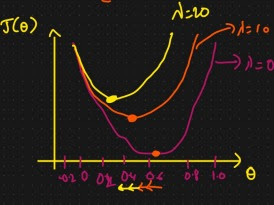Ridge, Lasso And ElasticNet Regression .
OVERVIEW
This blog is going to be very interested for the understanding point of view for ridge ,lasso and elastic net regression . Let first understand what is lasso and Ridge and ElasticNet.
Overfitting and Underfitting
- Overfitting is a condition where bias is low but variance tends to get high and results in fitting too much in a model, whereas in
- Underfitting, the variance is low but bias tends to get high and the model becomes too loose or simplified.
Also, when we can’t examine anything from the machine learning algorithm, we can say it is an underfitting condition, whereas, when data provides excessive information that we don’t even need and this data is acting as a burden, we say it is an overfitting problem.
Regularization.
Regularization is a regression technique, which limits, regulates or shrinks the estimated coefficient towards zero. In other words, this technique does not encourage learning of more complex or flexible models, so as to avoid the risk of overfitting.
- Regularization is one of the ways to improve our model to work on unseen data by ignoring the less important features.
- Regularization minimizes the validation loss and tries to improve the accuracy of the model.
- It avoids overfitting by adding a penalty to the model with high variance, thereby shrinking the beta coefficients to zero
What is Ridge Regression(L2 regularization)?
It causes high variance among the independent variables, we can change the value of the independent variable but it will cause a loss of information.
So in Ridge regression, we make bias and variance proportional to each other, or it basically decreases the difference between actual and predictive values.
The Relation between the λ and slope is Inversely proportional
Note: In Ridge Regression slope(θ) value will reduce but it will never be reach zero.
What is Lasso Regression(L1 Reguralization)?
Lasso stands for Least Absolute Shrinkage Selector Operator, which is used for Reduce the features or feature selection.
It works the same as ridge regression when it comes to assigning the penalty for coefficient,
It removes the coefficient and the variables with the help of this process and limits the bias through the below formula
The Relation between the λ and slope is Inversely proportional
Since if "θ" reach xero then feature will be deleted. were least correlated feature get eliminated. It is robust for outliers.
What is Elastic Net Regression?
Elastic Net is regularized linear regression technique that combine L1 & L2 Regularisation.
ENR = Lasso Regression + Ridge Regression
The equation for ENR is given below-:
Difference between Ridge, Lasso and Elastic Net Regression
In terms of handling bias, Elastic Net is considered better than Ridge and Lasso regression, Small bias leads to the disturbance of prediction as it is dependent on a variable. Therefore Elastic Net is better in handling collinearity than the combined ridge and lasso regression.
Also, When it comes to complexity, again, Elastic Net performs better than ridge and lasso regression as both ridge and lasso, the number of variables is not significantly reduced. Here, incapability of reducing variables causes declination in model accuracy.
Ridge and Elastic Net could be considered better than the Lasso Regression as Lasso regression predictors do not perform as accurately as Ridge and Elastic Net. Lasso Regression tends to pick non-zero as predictors and sometimes it affects accuracy when relevant predictors are considered as non zero.
Conclusion
Undoubtedly, regression is a widely used technique, we just read about the Ridge, Lasso, and Elastic net Regression and how they help in regularization.













Comments
Post a Comment